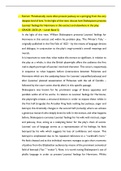- Extract: ‘Paradoxically, texts often present jealousy as a springing from the very
deepest kind of love.’ In the light of this view, discuss how Shakespeare presents
Leontes’ feelings for Hermione in this extract and elsewhere in the play.
- GRADE: 20/25 (A – Level/ Band 5)
In the light of this view, William Shakespeare presents Leontes’ feelings for
Hermione in this extract and within his problem play, ‘The Winter’s Tale,’ –
originally published in the First Folio of 1623 – by the means of language devices
and dialogue, in conjunction to the play’s tragi-comedy’s overall meanings and
morals.
It is important to note that, what makes this extract so significant, in relation to
the play as a whole, is that the British playwright offers the audience the first
real in-depth portrayal of Leontes’ mind and character. This occurs, respectively,
in sequence to what happens before (interactions between Polixenes and
Hermione which are the catalyzing factor for Leontes’ unjustified jealousy) and
after (Leontes’ planned assassination of Polixenes with the aid of Camillo –
followed by the court scene shortly after) in this specific passage.
Shakespeare was known for his prominent usage of binary opposites and
parallels within all of his works. In relation to Leontes’ feelings for Hermione,
the playwright creates a structural division in order to expose these: whilst in
the first half (tragedy) the Arcadian King feels nothing but jealousy, anger and
betrayal, this drastically changes in the second half (comedy) where we witness
a generous monarch who deeply loves his wife. In the extract, and what happens
before, Shakespeare connotes Leontes’ feelings for his wife with mistrust, anger
and jealousy, thus, acting as a catalyzing factor for the play’s chain of events.
Leontes’ use of language serves as a representation of his feelings; he feels
betrayed by his wife which suggests his loss of confidence and reason. This
betrayal is emphasized due to his repeated reference to a “cuckhold’s horn.”
He feels cheated and at this individual moment manages to gain short moments
of pathos from the Elizabethan audience by means of the prominent semantical
field of betrayal (“liar,” “traitor”). Next, it is worth noting Shakespeare’s use of
phallic language in order to present Leontes’ feelings for Hermione. Whilst
, accusing her of being a “adulteress,” he questions Camillo whether “My (his)
wife is slippery?” and describes her as a “hobby-horse.” This metaphor of riding
in connection to “slippery” points towards ‘illicit behavior’ as Williams (a critic)
states. The use of phallic symbolism “troth-plight”) is important as it reflects
Leontes’ growing anger and unjustified jealousy. This progressive use parallels
his emotions and create the start of the dramatic build up towards the play’s
climax: the court scene. Additionally, Leontes’ dialogue is charged with traces
of anger and hurt. As the repetition of questions (“? (…)?”) builds up a faster
pace of his speech and intensity, his repeated use of the imperatives shows his
internal desperation. He commands Camillo to “say’t and justify’t” and shortly
after to “Say it be, ‘tis true.” This effective use of imperatives gives the
impression that he is trying to convince himself more than anyone else, the
question this evokes is why? Simply, Leontes mind is torn and tortured can be
seen in the use of anadiplosis as he states “you never spoke what did become
you loss.” His love for Hermione is so powerful of internal references to believe
that she is an “adulteress”, however lets his words race ahead his mind
(“cogitation/ Resides not in that man that does think”) which results him to be
blinded by his ironic jealousy. This insecurity within himself turns more powerful
emotions, such as anger and jealousy, as a form of defensive mechanism.
In the second half of the play, the Elizabethan audience would have been
delighted to witness a different emotional spectrum of Leontes’ feelings towards
Hermione: one filled with love and sorrow. With the aid of the previously
heavily used pastoral imagery in Act 4 (in reference to flowers and their
symbolism such as “remembrance and rue”), Shakespeare manages to
foreshadow the character, and therefore emotional development in Leontes.
Due to Mamillius’ death, Hermione also dies, this leading to the “wide gap” of
sixteen years which separates both halves in the play and in which Leontes
submerges himself in penance. His counselors, Cleomenes and Dion, suggest
that Leontes should end his “saint-like sorrow” and this is the first stage of
Shakespeare’s ne presentation of Leontes’ feelings towards Hermione. This is
due to the fact that, in the patriarchal epoch of the play, such an extensive





